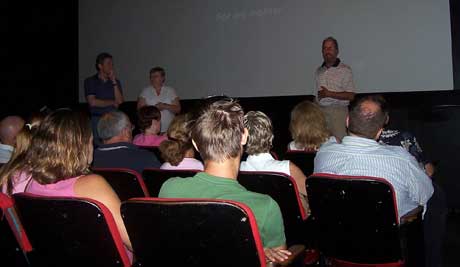Search The State, South Carolina’s largest newspaper, and you will find 1,168 stories about football. During that same period, the paper ran 497 stories mentioning Iraq.
Category Archives: SC News/Commentary
Welcome to the Third World
These clips were shot in Lexington County. The facility is just part of a complex housing hundreds of gamecocks, each chained by a three-foot tether. Their lives are grim; their fates even darker. Why, one wonders, is this place allowed to operate?
Vet Challenges SC Senators
Sens. DeMint and Graham: How in good conscience can you do this to our troops?
By Bobby Muller, Veterans for America
I have a fundamental question for you two – a really simple basic question. One that every American should be asking themselves right now as you – and the rest of our Senators – get ready to return from your month-long break.
When the former Chairman of the Joint Chiefs of Staff said that our troops were at their breaking point, when the Department of Defense reported that our current deployment policies are compounding the wounds of war, causing mental health problems among our troops to skyrocket, and that one of the primary causes was our current policy of deploying troops back to Iraq and Afghanistan without adequate dwell time at home, why didn’t you do something about it?
How can you not support a policy where soldiers are deployed for 15 months in Iraq and then receive at least equal time stationed stateside to rest, train, and then fight again? (And at least three times that much at home if they are from the Guard or Reserve.)
Well guess what? You aren’t alone. Back in July before you took your summer break, a lot of United States Senators voted against this fundamental act of fairness by voting against the Webb-Hagel Amendment. (See a press conference where I spoke up for this bill before the vote.)
An Invitation from Harriet
This came today from longtime Network friend Harriet Johnson, a Charleston lawyer and writer who is a nationally recognized activist. She’s also a hero in her home state. She is one of the Network’s past Thunder and Lightning Award winners, an annual tradition of honoring our best and brightest. Her law practice works primarily on securing benefits and civil rights claims for people with disabilities. She is a regular contributor to the New York Times Magazine and to the disability press, and is the author of the books Too Late to Die Young and Accidents of Nature.
*************
Friends, colleagues, and comrades: I just got my MDA patient magazine, and there in the middle was a full-color spread with Jerry Lewis’s picture and caption “Yup, it’s that time again.”
Yup, it is that time again. Time for the 17th annual telethon protest in Charleston.
So please join me in downtown Charleston on Labor Day morning to let people know that there are two sides to the telethon. Sure, the money does some good, but at a great price. The telethon continues to reinforce harmful stereotypes about disability, especially neuromuscular disease. MDA continues to put children on the air and tell the world that they are dying, when the truth is that they are also living, and some of them may live long enough to get that letter from AARP.
MDA also continues to employ a notorious disability bigot as its spokesman. Jerry has never apologized for calling us “half persons,” or for saying that disabled kids are “mistakes who came out wrong,” to name just two of many insults. He justifies this by saying he raises a lot of money. But other charities raise money and do good without insulting the people they are supposed to help.
Beyond that, the telethon protest is a chance to remind the public that we shouldn’t have to beg for flu shots and wheelchairs. Everyone, disabled or not, should have such basic needs met.
We gather at 10 a.m. and pass out leaflets for a couple of hours with a police permit. The tourists are generally curious and often supportive. Following the protests, lunch is on me. RSVP 843-722-0178 to find out where. HARRIET
PS: We finish in time for you to go to the ILA Labor Day picnic and then come back downtown for the 7 p.m. Labor Day program at the College of Charleston School of Business (organized by one of our favorite historians, George Hopkins). This will be a great lead-in to a series of eclectic programs sponsored by the Social Justice Project throughout the year – including an Oct. 3 appearance by Laura Hershey.
Hope to see you soon!
Harriet Johnson
hmjohnson1@earthlink.net
We Got Sick
And you should too.
Yesterday an overflow crowd turned out for the Network’s matinee screening of SICKO, Michael Moore’s newest documentary. The film takes the pulse of this country’s health care system, and the prognosis looks grim. But, if our crowd was any indication, the masses are ripe for change. Even with extra folding chairs set up in the aisles, the Nickelodeon Theater had to turn away people who wanted to see the film and talk about it afterward with organizers of a new group, South Carolinians for Universal Health Care.
It was a surprisingly responsive audience for Columbia, usually a reserved lot in public spaces. They laughed. They cried. They shook their heads. They muttered things under their breath. And when it was over, many of them signed on to a public effort to advocate from the grassroots for a more humane health care system.
The film is funny, frightening and, in the end, hopeful. See it if you can. If not, at least check out Michael Moore’s web site.
And if you want to get on board the campaign for universal health care in South Carolina, email us at network@scpronet.com.
Our thanks to our discussion panelists Lynn Bailey, a health economist for South Carolinians for Universal Health Care, Dr. Sam Baker, health policy professor at USC, and to Columbia radio host Frank Knapp for facilitating.
Becci Robbins
(From left) Frank Knapp, Lynn Bailey and Dr. Sam Baker.
War Profiteering
War Profiteering Corruption from Lexington County to the White House
by Tom Turnipseed
A businesswoman in my home county of Lexington, SC, pleaded guilty on Aug. 16 to defrauding U.S. taxpayers of $20.5 million in shipping costs for Pentagon supplies. According to a front page story in The State newspaper, “Charlene Corley, 46, pleaded guilty to a nine-year fraud that included charging the Pentagon $998,798.38 for shipping two 19-cent bolt washers.â€
The State reported Pentagon records showed that C&D Distributors, co-owned by Ms Corley and her sister Darlene Wooten, received $455,000 to ship three machine screws costing $1.31 each to Marines in Habbaniyah, Iraq. Ms. Wooten committed suicide in October, 2006 and Ms. Corley’s attorney contended Corley was a victim of her deceased sister’s activities, but federal prosecutors said Corley “knew the shipping costs, worked with local suppliers to get equipment for the Pentagon, corresponded with the Defense Department and was a contact on the computerized forms used to bid on the contracts.â€
Federal prosecutor Kevin McDonald said, “These twin sisters split the assets. Charlene Corley and Darlene Wooten equally shared in the proceeds of this fraud.†With the proceeds the sisters bought 4 beach houses; 3 Mercedes S and SL models; a 2007 BMW 550i; 5 slightly older Lexus models; a 23-foot outboard Suntracker boat; a 10 foot inboard Kawaski jet, and a vacation to Alaska.
Tee’d Off About Free Speech?
Our webmaster, Steve, poses a question after hearing the news of Bush protesters’ recent court win:
Feds pay $80,000 to couple arrested for wearing Bush protest T-shirts: Read story at ABC News.
How much are the Feds paying Brett, again?
-s
Examining School Choice
School Choice Not the Best Option for African American Children
By Hayes Mizell
Resting in their heavenly repose, South Carolina’s civil rights pioneers of the 1930s and 1940s must be scratching their heads. A prominent African-American state senator, also a Democrat and minister, says many of his generational peers are longing for the days of racially segregated schools. Another minister says most African-American children “fared better when we were segregated.â€
These leaders are understandably frustrated. Too many children are not reaping the academic gains that African-Americans hoped would follow public school desegregation. On last year’s state achievement test, more than 40,000 African-American students in grades three through eight scored “Below Basic†in English/Language Arts. An average of 60 percent of all African-American students in third through eighth grade performed at the Below Basic level in science.
There is some good news. Thousands of African-American students are performing well, scoring at the highest levels, “Proficient†or “Advanced,†on the state test. However, thousands more have the unrealized potential to do so.
No Comment
This photo of Sen. Lindsey Graham was posted on TMZ’s site, of all places. Almost as interesting as the image – which may or may not be real (consider the source) – are the comments from the rabble. Yikes.
Collaborative Again Makes News
There is good news about the Collaborative for Community Trust in today’s paper. I’m glad to learn that the Simkins house will be saved and, perhaps, put to good community use. But how did this situation get so bad in the first place?
Cleve Sellars, who is on the board, wouldn’t comment on Catherine Fleming Bruce – who has badly mismanaged the Collaborative. Question is, where in the world has he and the rest of the board BEEN all this time? Seems to me that Bruce is not the only one to blame for running the Collaborative into a ditch.
Warren Bolton, who is on the editorial staff at The State, has been a longtime Collaborative board member. Sadly, he with the bully pulpit wasted an opportunity to shed light on the matter before it got to this point.
If you missed it, here’s a link to the story.
And if you haven’t seen the Simkins house, you can take a nifty virtual tour here.
Here is a letter from Ms. Bruce that ran in last week’s Free Times after the paper ran an editorial skewering her.
Simkins Restoration Requires Public-Private Partnership
I write today to personally acknowledge the support and encouragement shown by individuals, organizations, municipalities and corporations over the years to the Collaborative for Community Trust in its efforts with regard to the Modjeska Simkins House (City Watch, “Modjeska Simkins Deserves Better,†July 18). This has been a long and arduous journey for myself and for the Collaborative board, with our only concern being the preservation of a historically significant civil rights building that once bore an “uninhabitable†notice and whose legacy was on the brink of being lost forever. It is this passion that has kept the Simkins project afloat since 1995.
It is our wish and our agenda that our community have the civil rights centerpiece that we have worked all these years to bring to fruition. We took action so that Columbia might join the ranks of other Southern cities in embracing our role in the American civil rights movement through this facility.
The purchase, restoration and operation of a historic site is a gargantuan task, and even more so with a paucity of staff support and resources. Many would never have attempted it, as historic preservation is most often taken up these days by developers or well-financed institutions. But had the Collaborative not stepped up 12 years ago, the Simkins House would not be here today.
Even so, the restoration of the Simkins House could never have been accomplished by the energies of any private individual or private group alone. The nature of historic preservation mandates a public-private partnership. It cannot, nor was it ever intended to glorify, enrich or exalt any one person. When I got involved, I considered this preservation work to be a public service to the community. I had guidance from our board, help in submitting appropriate reports from our accountant and the encouragement of many friends. I hope that other ordinary people will continue to step out on faith to preserve history in their communities. The Collaborative board and myself took the risk, and while it required extreme personal sacrifice and challenge, I am grateful for their commitment.
I, along with the full board of the Collaborative for Community Trust, continue to pledge our full efforts to a successful Modjeska Simkins House as it benefits from ever broadening levels of support and partnerships.
Catherine Fleming Bruce
President, Collaborative
for Community Trust




